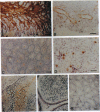Abstract
We have generated a series of transgenic mouse lines harboring the entire human germ cell alkaline phosphatase (GCAP) gene linked to progressively longer sequences of flanking DNA. A 450-bp promoter sequence directs the expression of GCAP to the intestine and endothelial cells, while a 5' sequence of 1.7 kb directs GCAP expression to the spermatogenic lineage and to the eight-cell through the blastocyst stage of preimplantation development. The expression of GCAP in these FVB/N transgenic mice induces a cellular immune tolerance to GCAP. When mouse fibrosarcoma MO4 cells (C3H derived), stably transfected with the cloned GCAP gene, were injected s.c. in nontransgenic control (C3H x FVB/N) hybrid mice, GCAP-positive tumor cells were rejected. However, when GCAP-expressing transgenic (C3H x FVB/N) hybrid mice were challenged with these cells, GCAP-positive tumors developed. Tumors also developed in the transgenic hybrid mice upon injection of MO4 cells transfected with the highly homologous placental alkaline phosphatase (PLAP) cDNA in spite of the presence in PLAP of 10 amino acids that are different from the corresponding residues in GCAP. These GCAP transgenic mice will allow the study of the immune response associated with the repeated administration of conjugated or derivatized anti-GCAP and anti-PLAP monoclonal antibodies. They will also enable evaluation of the therapeutic potential of bifunctional antibodies for T-cell recruitment and destruction of GCAP/PLAP-producing tumor cells.
Full text
PDF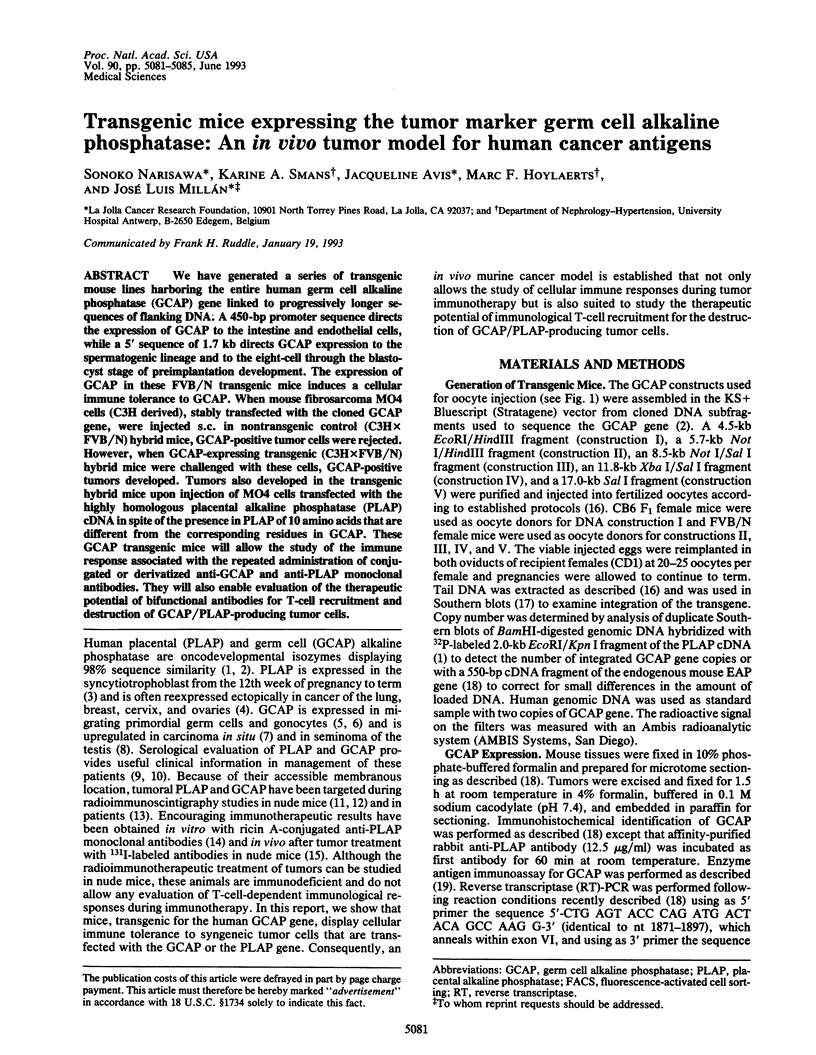
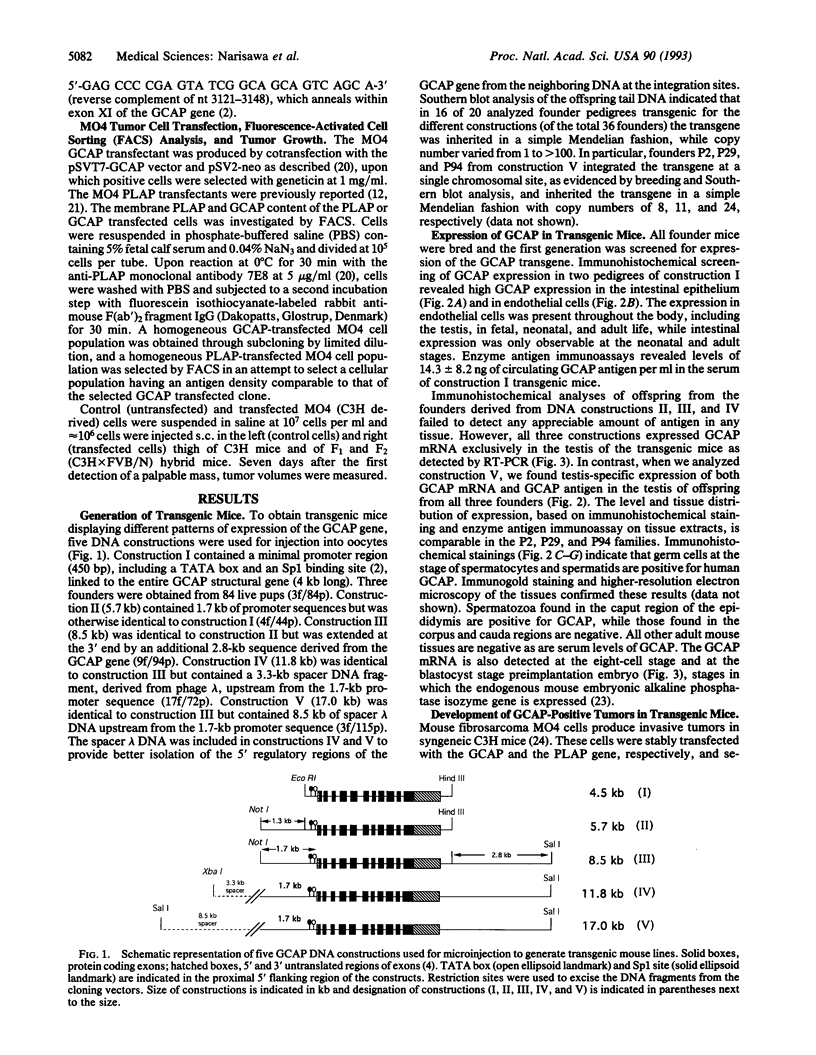
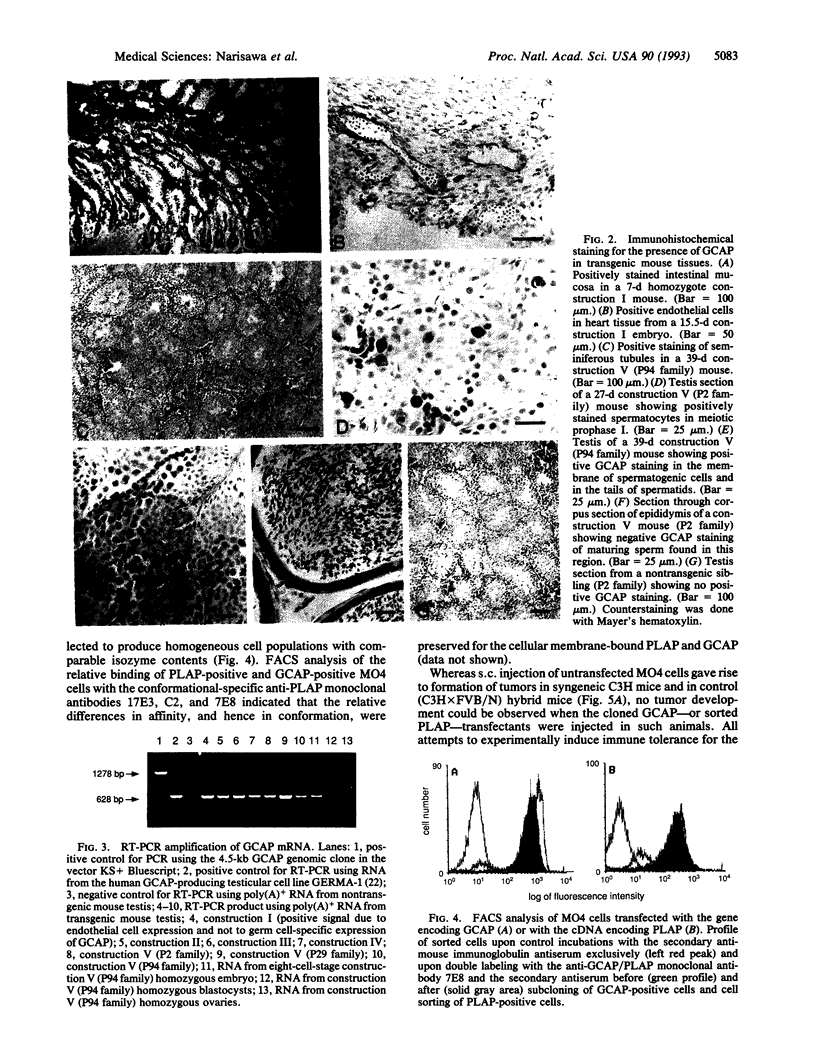
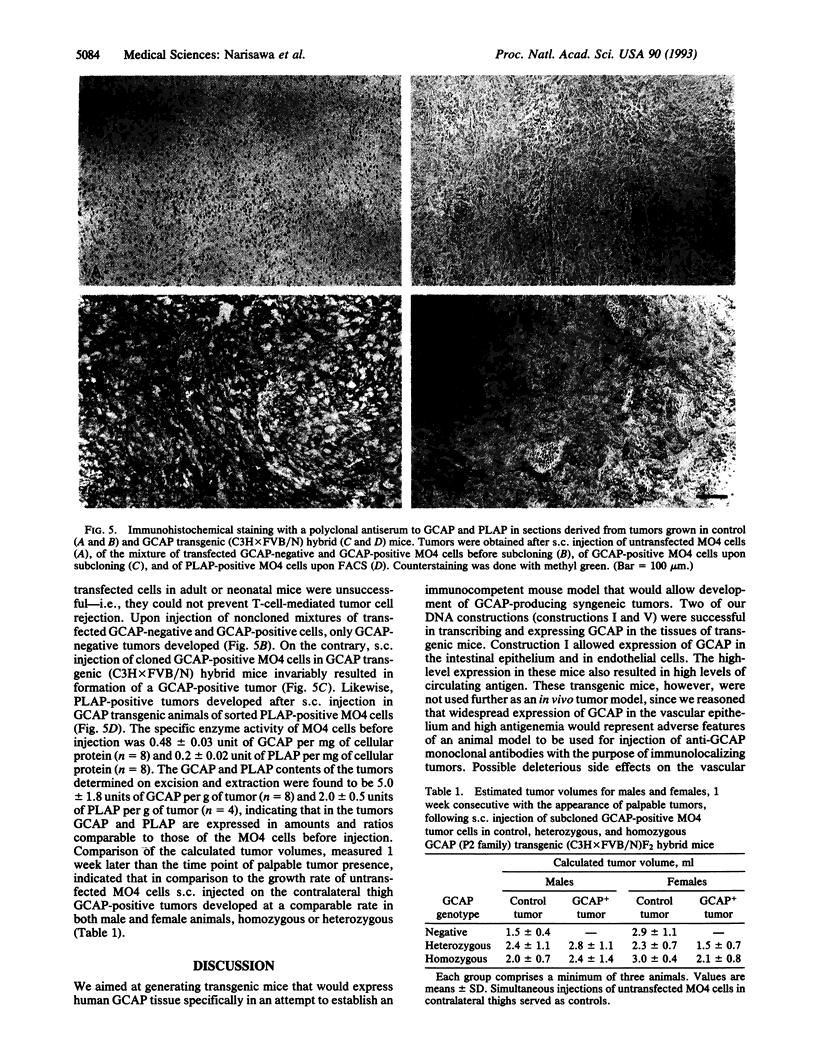
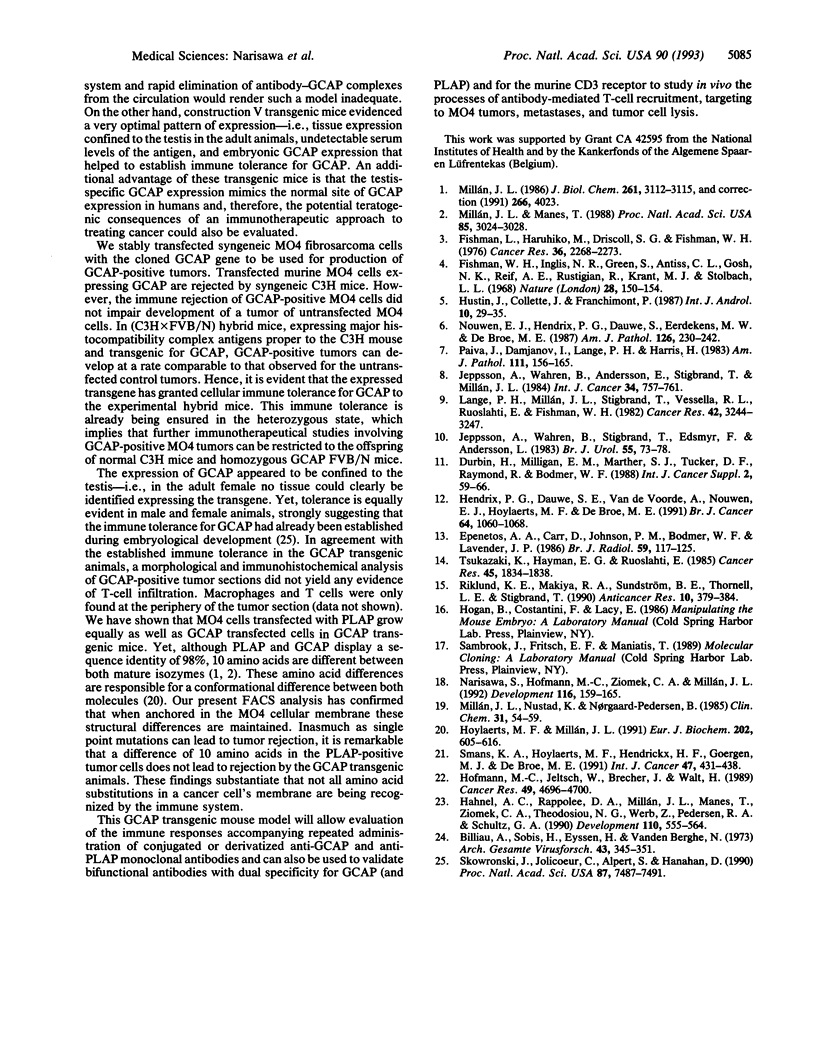
Images in this article
Selected References
These references are in PubMed. This may not be the complete list of references from this article.
- Billiau A., Sobis H., Eyssen H., Van den Berghe H. Non-infectious intracisternal A-type particles in a sarcoma-positive, leukemia-negative mouse cell line transformed by murine sarcoma virus (MSV). Arch Gesamte Virusforsch. 1973;43(4):345–351. doi: 10.1007/BF01556151. [DOI] [PubMed] [Google Scholar]
- Durbin H., Milligan E. M., Mather S. J., Tucker D. F., Raymond R., Bodmer W. F. Monoclonal antibodies to placental alkaline phosphatase: preclinical evaluation in a human xenograft tumour model of F(ab')2 and Fab fragments. Int J Cancer Suppl. 1988;2:59–66. doi: 10.1002/ijc.2910410715. [DOI] [PubMed] [Google Scholar]
- Epenetos A. A., Carr D., Johnson P. M., Bodmer W. F., Lavender J. P. Antibody-guided radiolocalisation of tumours in patients with testicular or ovarian cancer using two radioiodinated monoclonal antibodies to placental alkaline phosphatase. Br J Radiol. 1986 Feb;59(698):117–125. doi: 10.1259/0007-1285-59-698-117. [DOI] [PubMed] [Google Scholar]
- Fishman L., Miyayama H., Driscoll S. G., Fishman W. H. Developmental phase-specific alkaline phosphatase isoenzymes of human placenta and their occurrence in human cancer. Cancer Res. 1976 Jul;36(7 Pt 1):2268–2273. [PubMed] [Google Scholar]
- Hahnel A. C., Rappolee D. A., Millan J. L., Manes T., Ziomek C. A., Theodosiou N. G., Werb Z., Pedersen R. A., Schultz G. A. Two alkaline phosphatase genes are expressed during early development in the mouse embryo. Development. 1990 Oct;110(2):555–564. doi: 10.1242/dev.110.2.555. [DOI] [PubMed] [Google Scholar]
- Hendrix P. G., Dauwe S. E., Van De Voorde A., Nouwen E. J., Hoylaerts M. F., De Broe M. E. Radiolocalisation and imaging of stably HPLAP-transfected MO4 tumours with monoclonal antibodies and fragments. Br J Cancer. 1991 Dec;64(6):1060–1068. doi: 10.1038/bjc.1991.465. [DOI] [PMC free article] [PubMed] [Google Scholar]
- Hofmann M. C., Jeltsch W., Brecher J., Walt H. Alkaline phosphatase isozymes in human testicular germ cell tumors, their precancerous stage, and three related cell lines. Cancer Res. 1989 Sep 1;49(17):4696–4700. [PubMed] [Google Scholar]
- Hoylaerts M. F., Millán J. L. Site-directed mutagenesis and epitope-mapped monoclonal antibodies define a catalytically important conformational difference between human placental and germ cell alkaline phosphatase. Eur J Biochem. 1991 Dec 5;202(2):605–616. doi: 10.1111/j.1432-1033.1991.tb16414.x. [DOI] [PubMed] [Google Scholar]
- Hustin J., Collette J., Franchimont P. Immunohistochemical demonstration of placental alkaline phosphatase in various states of testicular development and in germ cell tumours. Int J Androl. 1987 Feb;10(1):29–35. doi: 10.1111/j.1365-2605.1987.tb00162.x. [DOI] [PubMed] [Google Scholar]
- Jeppsson A., Wahren B., Brehmer-Andersson E., Silfverswärd C., Stigbrand T., Millán J. L. Eutopic expression of placental-like alkaline phosphatase in testicular tumors. Int J Cancer. 1984 Dec 15;34(6):757–761. doi: 10.1002/ijc.2910340604. [DOI] [PubMed] [Google Scholar]
- Jeppsson A., Wahren B., Stigbrand T., Edsmyr F., Andersson L. A clinical evaluation of serum placental alkaline phosphatase in seminoma patients. Br J Urol. 1983 Feb;55(1):73–78. doi: 10.1111/j.1464-410x.1983.tb07083.x. [DOI] [PubMed] [Google Scholar]
- Lange P. H., Millan J. L., Stigbrand T., Vessella R. L., Ruoslahti E., Fishman W. H. Placental alkaline phosphatase as a tumor marker for seminoma. Cancer Res. 1982 Aug;42(8):3244–3247. [PubMed] [Google Scholar]
- Millán J. L., Manes T. Seminoma-derived Nagao isozyme is encoded by a germ-cell alkaline phosphatase gene. Proc Natl Acad Sci U S A. 1988 May;85(9):3024–3028. doi: 10.1073/pnas.85.9.3024. [DOI] [PMC free article] [PubMed] [Google Scholar]
- Millán J. L., Nustad K., Nørgaard-Pedersen B. Highly sensitive solid-phase immunoenzymometric assay for placental and placental-like alkaline phosphatases with a monoclonal antibody and monodisperse polymer particles. Clin Chem. 1985 Jan;31(1):54–59. [PubMed] [Google Scholar]
- Narisawa S., Hofmann M. C., Ziomek C. A., Millán J. L. Embryonic alkaline phosphatase is expressed at M-phase in the spermatogenic lineage of the mouse. Development. 1992 Sep;116(1):159–165. doi: 10.1242/dev.116.1.159. [DOI] [PubMed] [Google Scholar]
- Nouwen E. J., Hendrix P. G., Dauwe S., Eerdekens M. W., De Broe M. E. Tumor markers in the human ovary and its neoplasms. A comparative immunohistochemical study. Am J Pathol. 1987 Feb;126(2):230–242. [PMC free article] [PubMed] [Google Scholar]
- Paiva J., Damjanov I., Lange P. H., Harris H. Immunohistochemical localization of placental-like alkaline phosphatase in testis and germ-cell tumors using monoclonal antibodies. Am J Pathol. 1983 May;111(2):156–165. [PMC free article] [PubMed] [Google Scholar]
- Riklund K. E., Makiya R. A., Sundström B. E., Thornell L. E., Stigbrand T. I. Experimental radioimmunotherapy of HeLa tumours in nude mice with 131I-labeled monoclonal antibodies. Anticancer Res. 1990 Mar-Apr;10(2A):379–384. [PubMed] [Google Scholar]
- Skowronski J., Jolicoeur C., Alpert S., Hanahan D. Determinants of the B-cell response against a transgenic autoantigen. Proc Natl Acad Sci U S A. 1990 Oct;87(19):7487–7491. doi: 10.1073/pnas.87.19.7487. [DOI] [PMC free article] [PubMed] [Google Scholar]
- Smans K. A., Hoylaerts M. F., Hendrickx H. F., Goergen M. J., De Broe M. E. Tumor-cell lysis by in-situ-activated human peripheral-blood mononuclear cells. Int J Cancer. 1991 Feb 1;47(3):431–438. doi: 10.1002/ijc.2910470321. [DOI] [PubMed] [Google Scholar]
- Tsukazaki K., Hayman E. G., Ruoslahti E. Effects of ricin A chain conjugates of monoclonal antibodies to human alpha-fetoprotein and placental alkaline phosphatase on antigen-producing tumor cells in culture. Cancer Res. 1985 Apr;45(4):1834–1838. [PubMed] [Google Scholar]



